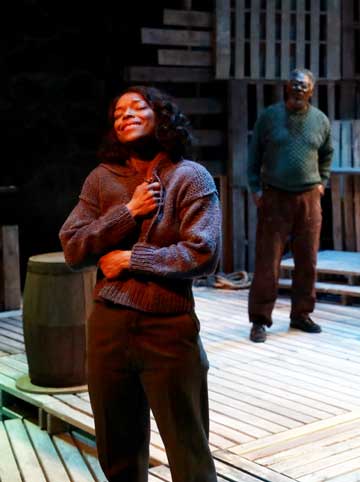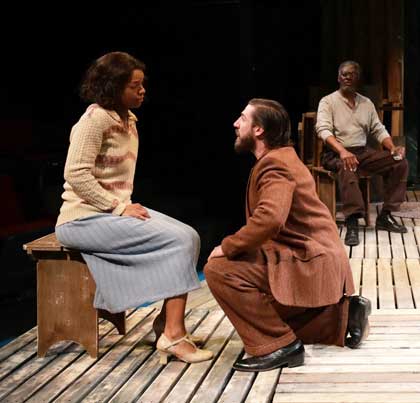Play (1921)
by Eugene O’Neill
Adapted and directed by Scott Edmiston
Lyric Stage Company of Boston
Copley Square area, Boston
April 6 – May 6, 2018
Scenic Design: Janie E. Howland; Costume Design: Charles Schoonmaker; Lighting Design: Karen Perlow; Composer/Sound Design: Dewey Dellay
With Johnny Lee Davenport (Chris Chrstopherson), Lindsey McWhorter (Anna Christie), Dan Whelton (Mat Burke); Nancy E. Carroll (Marthy), James R. Milord (Larry)

Johnny Lee Davenport as Chris Christopherson
in “Anna Christie”
Photo: Mark S. Howard
Courtesy of Lyric Stage Company of Boston
After her mother dies, Anna Christofferson aka Anna Christie (Lindsey McWhorter), has been left as a child with relatives in Minnesota (in the original play, it is Sweden) by her seafaring father, Chris Christopherson (Johnny Davenport). She has had a rough time of it and they have not seen one another in twenty years. In need, she now comes to see him in New York and takes up living with him on his barge duty. An Irish-American seaman, Mat Burke (Dan Whelton), shows up and the inevitable happens. Anna and Mat fall in love, but things are not so easy. Chris doesn’t want them together and Anna feels that she is unworthy of the relationship, not having confessed her sordid past to Mat. Somehow, remarkably, despite having O’Neill as the author, things sort of work out.
Lindsey McWhorter provides the radiant center of this engaging emotional triangle, perched between the controlling and worried father and the intoxicated and besotted Mat. Conveying a persuasive balance between Anna’s magnetism and her shame, McWhorter manages to make her both an attractive protagonist and a pathetic one. McWhorter’s skill at riding the edge between self-destruction and existential durability enables her Anna to form an eddy of desire and rage that swirls the father and the lover in a torrent around her.

Dan Whelton as Mat Burke
Johnny Lee Davenport as Chris Christopherson
in “Anna Christie”
Photo: Mark S. Howard
Courtesy of Lyric Stage Company of Boston
Whelton’s Mat is fierce, drunk, vital and scarily attractive, as, no doubt, Eugene O’Neill envisioned him. He has all the traits of the typical Irish-American self-defeaters that O’Neill religiously portrays throughout his career. Nonetheless, this is O’Neill early and lite, so even Mat gets a break. But Whelton carries the force convincingly, even if the character is a bit of a numbskull, especially when he has to deal with coming to terms with Anna’s past history.
Johnny Davenport makes a sweet and doting father, sometimes manipulative and disagreeable, but by and large feebly penitent for his absent parenting. Davenport enables a duality of looming ferocity and sheepish doting that makes the newly-found parental role intriguing and vulnerable.
This production features African-American actors playing the originally-Scandinavian father and daughter, a nicely inventive departure. The interracial romance between Anna and Mat adds another dimension to the otherwise inter-religious engagement of the original. (The Irish-Catholic Mat falls for the Scandinavian-Protestant Anna.)
Scott Edmiston, in addition to offering expert direction, has provided a trimmed down script that runs to just two hours. One usually can’t get out of an O’Neill play before three or more, so this seems sleek and lithe. Though one easily imagines additional layers of O’Neill dialogue complicating the already belabored characters, this trimmed version seems to give enough of the idea while coloring in with sufficient amounts of angst to make it reverberate as bona fide O’Neill.
The lighting design by Karen Perlow enhancing Janie E. Howland’s sets is noteworthy as is Dewey Dellay’s moody and effective score.
This is certainly O’Neill worth seeing. Its early and not completely devastating narrative delivers his existential baggage in a somewhat homeopathic dose both in terms of time and emotion. The play, and this excellent production, offer their own significant rewards; they also provide some preparation and training for the heavier, later, dreadfully tragic epics for which O’Neill is best known.
– BADMan
Leave a Reply